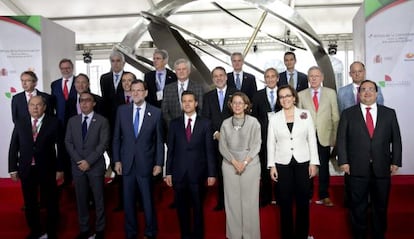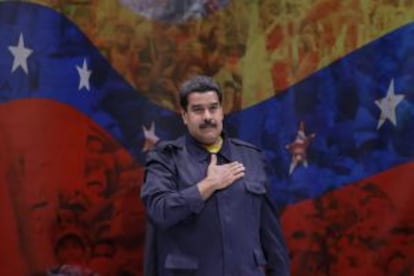Latin America seeks new growth model based on quality education
Leaders at Ibero-American Summit also propose sweeping structural reforms

Latin America is in search of a new economic model. With the era of five-percent annual growth over, the region is asking: now what?
That is the question lingering over the hallways and high-powered meetings at the Ibero-American Summit now taking place in Veracruz, Mexico.
So far, no single reply has attracted unanimous support, although a double formula appears to be emerging out of the debate: sweeping structural reforms and a big push towards quality education. Call it the Veracruz recipe for growth.
“We need to enter a second generation of public policy in order to return to growth,” says Ibero-American secretary general Rebeca Grynspan. “We have reached the end of a cycle at the international level, and the only way to deal with that is through a revolution in productivity and an explosion of innovation.”
Faced with the sudden slowdown and the imminent end of easy financing through the dollar, Latin American leaders are closely following events in Spain and Mexico, two countries that have adopted profound and, in some cases, highly painful reforms. Although the measures have been praised by international organizations, most particularly the International Monetary Fund (IMF), neither country can claim victory just yet.
In the case of Mexico, the economic agenda is a follow-up to the legislative changes, but it has yet to produce the desired results: GDP growth remains below the average of the last 20 years, and the psychological barrier of three percent will not be reached before 2015.
Meanwhile, in Spain, while Prime Minister Mariano Rajoy proudly boasts about the highest growth in the euro zone (1.7 percent in 2015 according to the IMF, or upwards of two percent according to the Spanish government), the country still holds the less enviable record for joblessness, at 23.64 percent.
In any case, it is not a soothing scenario for outside observers. But to countries that have seen the raw materials’ boom come to an end and the specter of social unrest make a comeback, there is a pressing need to find vigorous policies that will ensure the region does not fall off the international prosperity wagon – a possibility that is becoming increasingly likely.

“We failed to make the most of accumulated wealth over these past years; we did not invest where we should have, in education, infrastructure and innovation,” said Costa Rica President Luis Guillermo Solís. “And there’s a danger that we could miss the boat again. We need to open up to the world. [...] We need to support technology transfer, end mercantile monogamy and chain ourselves to the global economy.”
This need for economic openness coincides with the fact that public is increasingly demanding and well informed. Experts believe that transparency has become a necessity, and not just to end corruption, which sucks up seven percent of Latin America’s GDP, but also to release the region’s economic potential. It is the kind of challenge that Grynspan believes can only be addressed with an urgent agenda based on improving the quality of education.
“Change is taking place at an unprecedented pace; a revolution is underway via digital technology,” said Ana Patricia Botín, the new chair of the Santander Group. “It will not be natural resources that decide the future of Iberoamerica, it will be human capital.” Botín’s banking group plans to invest $945 million over the next four years on a support program for university projects in the area.
But improvements in education will come up against a strong adversary in the region: inequality. Only nine percent of students from the poorest 20 percent of the region’s population ever make it to university, compared with 50 percent from the wealthiest 20 percent.
If you want to go fast, go it alone; but if you want to go far, do it in company” Rebeca Grynspan, Ibero-America secretary general
“It’s tremendous, it means that inequality is handed down from generation to generation,” said Organisation for Economic Co-operation and Development (OECD) secretary general José Angel Gurría.
Yet the Veracruz recipe for ending inequality is not to everyone’s liking. A yawning gap is opening up on the continent, and the conspicuous absences from the summit – as of late Monday: Brazil, Argentina, Venezuela, Bolivia and Nicaragua – delineate this fracture.
Brazil is trapped in a labyrinth of its own making. Argentina is reeling under the crunch of recession. And the crisis in Venezuela is accelerating apace with government proposals that take it further away from the region’s liberal axis, best illustrated by the Pacific Alliance of Mexico, Colombia, Chile and Peru, which together represent 36 percent of Latin America’s GDP. This trade zone, which has eliminated duty on 92 percent of products, is displaying such an unexpected vitality that it is already planning to expand commercially to Asian countries.
These divergent paths among groups of Latin American nations can only herald an era of friction. Nobody questions the impossibility of homogenizing the economies of an area with a population of 605 million and representing 10 percent of global GDP, but regional leaders know about the healing effects of synergies.
“Economic growth and trade exchanges among Ibero-American countries are indispensable conditions to achieve greater levels of well-being, better wealth distribution and an effective fight against unemployment,” said Spain’s King Felipe VI, speaking in Veracruz.
Or as the Ibero-American secretary general put it: “If you want to go fast, go it alone; but if you want to go far, do it in company.”







































